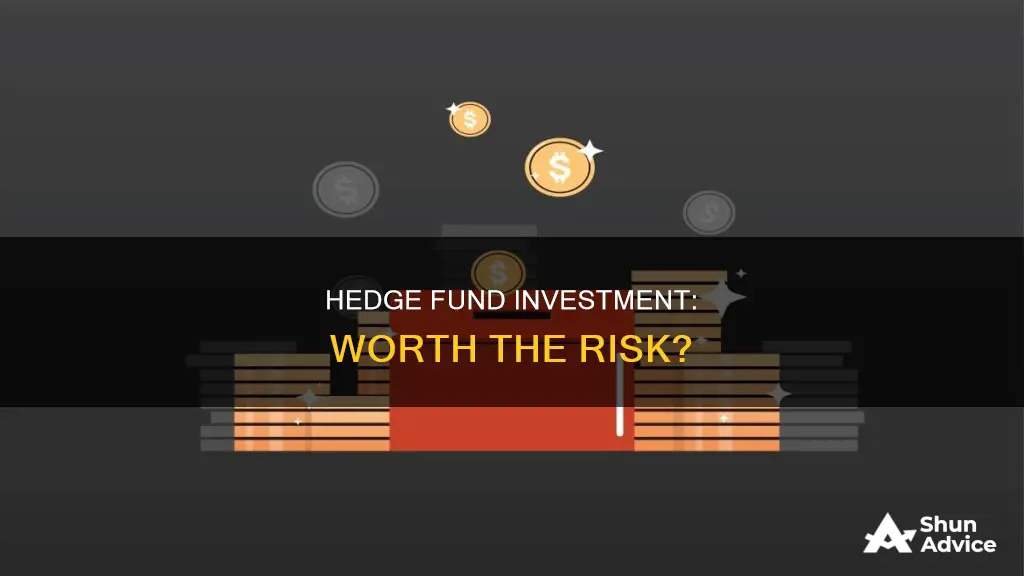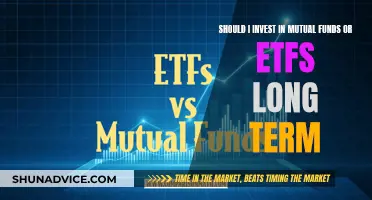
Hedge funds are a type of investment used by wealthy, accredited investors. They are actively managed funds that aim to maximise returns and minimise risk. However, they are typically less regulated and riskier than more traditional investments such as mutual funds. They also tend to have higher fees and minimum investment requirements. So, is investing in a hedge fund worth it? This article will explore the benefits and drawbacks of hedge funds to help you decide if they are the right investment choice for you.
| Characteristics | Values |
|---|---|
| Risk | Riskier than other investments |
| Returns | Potentially higher returns |
| Regulation | Less regulated than other funds |
| Accessibility | Only accessible to accredited investors |
| Fees | Higher fees than other funds |
| Liquidity | Less liquid than other funds |
What You'll Learn

High fees and high minimum investment requirements
Hedge funds are known for their high fees and high minimum investment requirements. Fees can be a major concern for investors, as they can eat into overall returns. Hedge funds typically charge an asset management fee of 1% to 2% of the amount invested, as well as a performance fee of 20% of the fund's profit. These fees are significantly higher than those of mutual funds or exchange-traded funds (ETFs). For example, the average expense ratio for mutual funds and ETFs in 2022 was 0.37%.
Minimum initial investment amounts for hedge funds can range from $25,000 to upwards of $2 million. These high minimums often make hedge funds inaccessible to all but the wealthiest investors. Additionally, hedge funds are less liquid than stocks or bonds, with lock-up periods that can last at least a year or more, further restricting access for investors who may not be able to tie up their money for extended periods.
The high fees and minimum investment requirements of hedge funds can make them unattractive to some investors, especially when compared to other investment options with lower fees and minimums, such as mutual funds or ETFs.
SS Funds: Where Are Your Contributions Invested?
You may want to see also

Riskier investments and aggressive trading strategies
Hedge funds are known for their riskier investments and aggressive trading strategies. They employ complex investing strategies that can include the use of leverage, derivatives, or alternative asset classes to boost returns.
Hedge funds are not limited in the same ways mutual funds are. They can use leveraged, debt-based investing and short-selling, and they can purchase types of assets other funds can’t invest in, like real estate, art, and currency. These strategies come with significant risk and can lead to extreme losses.
Hedge funds are considered riskier investments because they often place bets on investments seeking outsized, shorter-term gains, sometimes with borrowed money. These bets can lose, and when they do, the losses can be substantial.
Hedge funds take on these riskier strategies to produce returns regardless of market conditions, which appeals to investors looking to continue earning returns even in bear markets.
Hedge fund managers have the latitude to use more aggressive trading strategies than their mutual fund counterparts. They can make highly concentrated bets by investing the fund's capital in just a few assets, and they often use leverage, which involves borrowing money to make trades. Leverage can amplify returns and losses.
Hedge funds are only accessible to accredited investors, or high-net-worth individuals or organizations, who are presumed to understand the unique risks associated with hedge funds. These investors must meet a minimum level of income or assets and are typically institutional investors, such as pension funds and insurance companies, or wealthy individuals.
While hedge funds can provide diversification and enhance overall returns, they also come with high fee structures and can be more opaque and risky than traditional investments. Investors need to carefully consider the cost-benefit calculation of a fund's strategy and value proposition before investing.
Borrowing to Invest: Risky Real Estate Mutual Funds
You may want to see also

Lack of transparency and regulation
Hedge funds are less regulated than mutual funds or traditional financial advisors. In the US, they are subject to fewer regulations and disclosure requirements, as they are not required to register with the Securities and Exchange Commission (SEC). This is because they don't advertise to the public and only cater to accredited investors.
This lack of transparency and regulation makes it harder for investors to verify a hedge fund's claims and see how their money is being invested.
However, the SEC has taken action against fraudulent hedge funds, suing those that have misrepresented investment returns, account statements, and fund managers' track records.
The SEC also places restrictions on who can invest in hedge funds. To invest as an individual, one must be an institutional investor, like a pension fund, or an accredited investor. Accredited investors have a net worth of at least $1 million (excluding their primary residence) or an annual income of over $200,000 ($300,000 if married).
Hedge funds also employ complex investing strategies that can be difficult for the average investor to understand. These strategies often involve the use of leverage, derivatives, and alternative asset classes, such as real estate and private companies, to boost returns.
Due to the high level of risk associated with hedge funds, it is important for investors to conduct thorough due diligence and carefully consider the fund's investment strategy, level of risk, fees, and potential conflicts of interest before investing.
A Guide to Investing in PGIM Mutual Funds
You may want to see also

Complex tax prep and reporting
The complex nature of hedge fund investments means that tax preparation and reporting can be challenging. Here are some key considerations:
- Tax Basis Capital Reporting: Funds are required to report each partner's capital account using a tax basis capital method. This involves a conversion from the GAAP basis to the tax basis method, which can be complex.
- Reconciliation of 1099s: It is important to reconcile 1099s with the fund's records as brokers may record transactions differently. This reconciliation process should be done early in the tax preparation process.
- Wash Sale Rule: The Wash Sale rule comes into effect if "substantially identical" securities are purchased within 30 days before or after the sale of another security at a loss. This can impact tax calculations.
- Constructive Sale: A constructive sale occurs when a taxpayer holds appreciated property (e.g., stock) at year-end and simultaneously holds a short position in the same or "substantially identical" property. This adds unrealized gains to taxable income.
- Qualified Business Income (QBI): QBI must be calculated on the Partner's Schedule K-1 using Form 8995. Each business creating QBI must be evaluated separately.
- U.S. Withholdings on Partnership Interest Transfers with ECI: When a non-U.S. person engages in a trade or business in the U.S., income from sources within the U.S. connected to that trade is generally considered Effectively Connected Income (ECI). This has specific IRS filing requirements, including Form 8288.
- Tax Form Requirements: Hedge funds must comply with various tax forms, including Form 1065, Form 1040, Form 1120, Form 1120-S, Schedule K-1, Form 1099, Form 1042-S, and more.
- International Tax Considerations: Hedge funds with international operations or investors need to consider additional tax requirements, such as foreign partnerships, blocking corporations' tax returns, and foreign master-feeder structures.
- IRS Audits: The IRS has increased scrutiny on high-income earners, including hedge funds. It is important for hedge funds to be prepared for potential audits and have processes in place to respond to audit notices.
- Tax Advising: Engaging specialized tax advisors or accountants can be beneficial for hedge funds to navigate the complex tax landscape and ensure compliance with applicable regulations.
Given the complexity of tax prep and reporting for hedge funds, it is essential to have a robust understanding of the applicable tax laws and regulations and seek professional guidance where needed.
A Beginner's Guide to REIT Funds in India
You may want to see also

Potential for higher returns
Investing in a hedge fund is a risky, alternative investment choice. Hedge funds are known for their riskier investments, attracting wealthier investors who are willing to take larger bets. They employ complex investing strategies that can include the use of leverage, derivatives, or alternative asset classes to boost returns.
Hedge funds are actively managed funds that aim to generate absolute returns regardless of the overall market or index movements. They are not limited in the same ways as mutual funds and can invest in a wider range of assets, such as real estate, art, and currency. This makes them appealing to investors looking to earn returns even in bear markets.
Hedge funds are also known for their aggressive investment strategies, such as leveraged, debt-based investing, and short-selling. They can produce higher returns, especially in a bear market. If your outlook is bearish, hedge funds become an attractive asset class compared to buy-and-hold or long-only mutual funds.
However, higher returns are not guaranteed. Most hedge funds invest in similar securities as mutual funds and individual investors. Therefore, you can reasonably expect higher returns only if you select a superior manager or a timely strategy.
Hedge funds are also more expensive than other pooled investment vehicles. They typically charge a management and performance fee, with a common fee structure being "two and twenty", where investors pay 2% per year of the assets being managed and another 20% of the profits.
In summary, hedge funds offer the potential for higher returns, especially in bearish markets, due to their ability to invest in a wider range of assets and their aggressive investment strategies. However, this potential comes with higher costs and increased risk.
Gold Mutual Funds: Best Investment Options for You
You may want to see also
Frequently asked questions
A hedge fund is a pool of money from multiple investors that is used to invest in stocks and other assets. Hedge funds are generally more aggressive, riskier, and more exclusive than mutual funds.
Hedge funds can produce higher returns than other investments, especially in a bear market. They also offer diversification benefits, as they tend to be uncorrelated with broad stock market indexes.
Hedge funds are much riskier than most other investments due to their aggressive investment strategies, such as leveraged investing and short-selling. They also carry high fees, typically including a 2% management fee and a 20% performance fee.
Due to the high levels of risk associated with hedge funds, the U.S. Securities and Exchange Commission (SEC) places restrictions on who can invest in them. To invest in hedge funds, individuals must be accredited investors, meaning they have a net worth of at least $1 million or an annual income of over $200,000.
First, research funds that are currently accepting new investors. Then, review the fund managers and investment goals using Form ADV. Finally, contact the hedge fund to inquire about minimum investment requirements and verify your status as an accredited investor.







